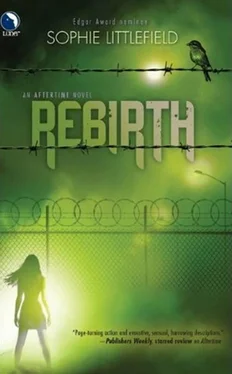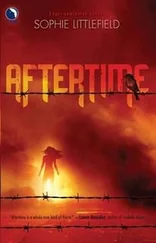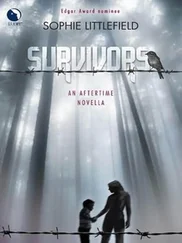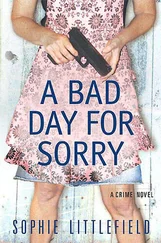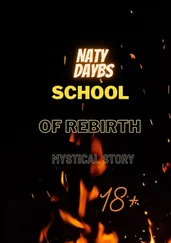Through the long night in the truck, Sammi shivered and wished she’d been killed, too. But she kept hearing her mother’s last words. Go with them . Well, she had, and she regretted it. Even in the dark she sensed the man staring at her. She knew what he wanted to do. She wished she’d done it with Jed first, because at least then Jed would have always been her first. They had talked about it, and Sammi had finally decided she wanted to and Jed had got some condoms. They just hadn’t gotten around to it. They were waiting for a night when they could be alone.
Sammi cried and felt the cold seep deeper inside her and stared at the stars. Sometimes she thought the stars were the most beautiful thing left, maybe the only beautiful thing left in the world. There were so many, it was almost like a thick and sparkling sauce had been spilled across the sky, and Sammi wondered if somewhere out there was a planet whose inhabitants hadn’t messed it up, hadn’t created their own monsters and poisons to kill themselves off.
She found her dad’s star, and almost didn’t say the words. She’d gotten used to the idea that he was dead; her mother said that it was better that way, that wishing for him to be alive was just pretending, and they didn’t have the luxury of pretending anymore; but until this night she had kept her promise. Every night she found her dad’s star and touched her nose with her fingers the way he taught her as far back as she could remember. “Who do I love best?” he used to ask and she would touch her nose with her finger because that meant Me! You love me! -but that wasn’t even the real part of it.
The real part was the star and the thing they said together. Before he left, even though Sammi was fourteen and too old for it, he would always take a break from his study and come find her, and it didn’t matter if she was watching TV, he would wait for a commercial; or if she was texting or painting her nails, whatever it was, he would wait and then they would go out on the deck and he would find the star and they would say it together. Just another way of saying I love you; she knew that now, but when she was little she had decided it had to be the same every time and so it was.
The night her dad left, his SUV packed with his stuff in the driveway, he hugged her hard and pointed to the sky and said the thing. “Never forget,” he said and kissed her nose, her forehead, and then he added, “Okay?” in a way that sounded so sad and tentative that Sammi promised after all even though she was so angry she had been planning to refuse.
Tonight she almost broke her promise because he’d left her and died, and now her mom had died and she was alone, and if that wasn’t his fault, well, she didn’t exactly know who else to blame. So she wasn’t going to say it.
But there the star was, as bright and yellow as it had ever been, and the man stared and she couldn’t see Jed and she wished she was dead…but she whispered the words:
“Star bright, you and me always.”
A few minutes later they stopped the truck so everyone could pee and the man with the beard, the one who stared, jumped to the ground and took them to the side of the road one at a time while the knife man watched everyone else, and when it was Jed’s turn, all three brothers jumped up and attacked the guard who’d killed her mother and broke his neck before the old man and the woman shot them. The Rebuilders wrapped the body of the dead guard in a tarp and lashed it to the top of the cab. They left Jed and his brothers lying facedown on the ground. And the rest of the way Jed’s mother screamed and Sammi was silent and knew she’d never keep any promise again.
DOR SCALED THE FENCE ONE LAST TIME, HIS movements quick and practiced, the calluses on his hands almost numb to the wire cutting his flesh. It was important that no one see him go. People would read things into his departure, and that could lead to trouble-looting and fighting, the kinds of things that happened when too many people shared too small a space with no one in charge. If all went well, there would be a general announcement, tomorrow, when Faye and Three-High and Joe and Sam and the rest could control the message, when they could reassure everyone that nothing was wrong, that Dor would soon be back.
He dropped to the ground and melted into the darkness quickly and quietly, and if anyone had been nearby watching they would have had a hard time guessing who had slipped past them in the moonlight.
The meeting had gone well enough. Lying to his team had become both easier and harder as the weeks had turned into months and this thing he started in the spring had grown into the community it was now, in the middle of November, two seasons and thousands of trades later.
The way Dor figured, every trade changed the Box in some small and fundamental way, shifting people’s personal equations of need and loss and rebalancing the entire community’s measures of hope and satiety. He believed that he was doing good, perhaps the most good it was possible to do in these times. But he had also never felt more alone. The more he was respected, the more he was admired, the further away-the more incomprehensible-other people seemed. And being in their midst didn’t help. Paradoxically, the only thing that helped was utter solitude.
He had never shared these thoughts. No, they had formed and refined in private, up in the quiet of the apartment building, as he watched the sun set over the Sierras, the one view that-in the moments when the blazing red light at the horizon obscured the silhouette of the naked dead trees-still looked like Before. He loved to let the burning last rays of daylight blind him, loved the warmth on his face, and most of all he loved forgetting-even for a moment-that he was responsible for so much. He had never meant to let people rely on him, to look up to him the way they had.
At first it was the old instinct that drove him, to buy cheap and sell dear, to work the deal-and yes, perhaps, on occasion the sleight of hand, the scam-to chase the excitement of being the fastest, shrewdest, richest. Before, his clients were never the point-the deal itself was all he cared about. In the columns of numbers were wide-open spaces, races to be run, scrimmages to be played out. His investments quivered and bobbed like skittish ponies, and so what if it was all artificial, he loved the game. Dor played his clients’ money like a conductor coaxing a tremulous crescendo from a woodwind section, relying on instinct as much as skill, chasing the high that came from nailing the trade, so much sweeter when he’d gambled big.
But the currency of the Box had somehow gotten away from him, so that in between the small comforts and cheap highs he dealt favors and forgiveness and loans and compassion. All of it anonymously, with only his most trusted employees acting as his agents, and it came at a cost: Dor had to be ever vigilant, aware of everything going on in every corner. He couldn’t afford to slip; he had to stay strong and resolute to lead and shape the Box because, aside from him, there was no steadying standard for society. There was no system, as there had been Before, to self-regulate.
Dor had a final errand to run, but it wasn’t to the apartment. He’d said goodbye to that place earlier, and if his thoughts had been truncated by Cass’s unexpected arrival, that was all right. An unaccustomed lapse in vigilance, the cause of which did not bear considering-worry for Sammi, no doubt, when he could afford no worry.
When he returned- if he returned-there would be time to mark any deterioration of his little community and repair what he could. He supposed that it would take some time to mend things with Sammi, as well. Teenagers were moody-hell, even before the Siege Sammi’d shown signs of pushing him away, and she’d been acting up at school. Last year she was passed over for varsity softball and suspended over something she supposedly wrote in the margins of an Algebra test.
Читать дальше
Конец ознакомительного отрывка
Купить книгу
